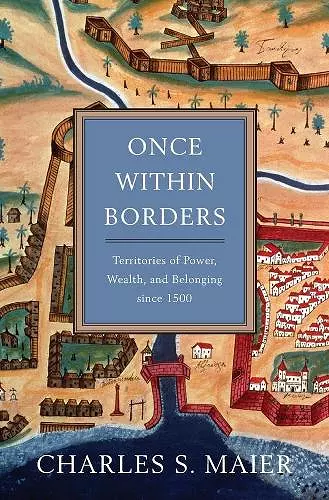Once Within Borders
Territories of Power, Wealth, and Belonging since 1500
Format:Hardback
Publisher:Harvard University Press
Published:27th Oct '16
Should be back in stock very soon

Throughout history, human societies have been organized preeminently as territories—politically bounded regions whose borders define the jurisdiction of laws and the movement of peoples. At a time when the technologies of globalization are eroding barriers to communication, transportation, and trade, Once Within Borders explores the fitful evolution of territorial organization as a worldwide practice of human societies. Master historian Charles S. Maier tracks the epochal changes that have defined territories over five centuries and draws attention to ideas and technologies that contribute to territoriality’s remarkable resilience.
Territorial boundaries transform geography into history by providing a framework for organizing political and economic life. But properties of territory—their meanings and applications—have changed considerably across space and time. In the West, modern territoriality developed in tandem with ideas of sovereignty in the seventeenth century. Sovereign rulers took steps to fortify their borders, map and privatize the land, and centralize their sway over the populations and resources within their domain. The arrival of railroads and the telegraph enabled territorial expansion at home and abroad as well as the extension of control over large spaces. By the late nineteenth century, the extent of a nation’s territory had become an index of its power, with overseas colonial possessions augmenting prestige and wealth and redefining territoriality.
Turning to the geopolitical crises of the twentieth century, Maier pays close attention to our present moment, asking in what ways modern nations and economies still live within borders and to what degree our societies have moved toward a post-territiorial world.
Charles Maier's new and brilliantly insightful book is a history of how political borders came to be constructed, contested and—or so it appeared—effaced, only to revive with a vengeance. Here is a new and subtle geopolitics for the post-global era of walls and barbed wire. -- Niall Ferguson, author of Kissinger, 1923–1968
No other historian of our present age could better this scholarly discourse upon states, borders, sovereignty, and geographic space in modern, post-1500 Europe, America, and the world. Professor Maier's erudition results in a fabulous, original work on what land and sea borders have meant, and still do mean, to governments and peoples, and to state and non-state actors. His easy discussion with some of the greatest European and American public thinkers, geopoliticians, historians, and philosophers is breathtaking. -- Paul Kennedy, author of Engineers of Victory
A brilliant synthesis of a wealth of empirical material about the birth and development of what is conventionally considered to be modernity. -- Geoff Eley, author of Nazism as Fascism
In this brilliant and sweeping narrative, Maier shows how, beginning in the seventeenth century, sovereignty and territory became intertwined as states built borders, reorganized systems of labor and capital, and forged domains of law and authority…Maier finds today’s world awash in fast-changing and deeply conflicting ideas about territory. The
interdependence of economies and the emergence of cyberspace seem to have reduced the salience of physical territorial control and weakened traditional notions of sovereignty and citizenship. But if Maier is correct, territory will continue to claim an important place in the human imagination.
It’s rare to find insightful contemporary political commentary in what is primarily a history book. Yet this tome could hardly be more timely. For anyone keen to understand the mass movements that fuelled everything from the EU referendum result to Trump’s election victory, you could do far worse than have a flick through Once Within Borders, exploring how the tinderbox where these particular fires caught ablaze came into existence. -- Chris Fitch * Geographical *
Charles Maier’s Once Within Borders is a splendid account of the changing notions of territory over the past five centuries. Maier is among the most distinguished living historians and this timely book has been years in the making…He shows how changing geopolitics, the advent of commercial society, rise of industrial technology and development of new techniques of governance impinged upon evolving the notions of territory. -- Srinath Raghavan * Mint *
Charles Maier ask[s] us to consider afresh the commonplace intellectual and experiential twinning of history and geography, of time and space, and by doing so open[s] up compelling new avenues for historical, geographical and social-scientific inquiry…A stimulating analysis of the history of territory as a concept. -- Robert Mayhew * Times Literary Supplement *
Maier’s book is a timely reminder that borders go back much farther than debates about border walls and hard borders…Maier shows how borders contributed to the creation of polities and our ideas about them, including sovereignty, in a sweeping review of the past 500 years of western history. -- Krisztina Csortea * International Affairs *
- Nominated for Laura Shannon Prize 2018
- Nominated for Jerry Bentley Prize 2017
- Nominated for Leo Gershoy Award 2017
- Nominated for Lepgold Book Prize 2017
- Nominated for ENMISA Distinguished Book Award 2018
ISBN: 9780674059788
Dimensions: unknown
Weight: unknown
416 pages